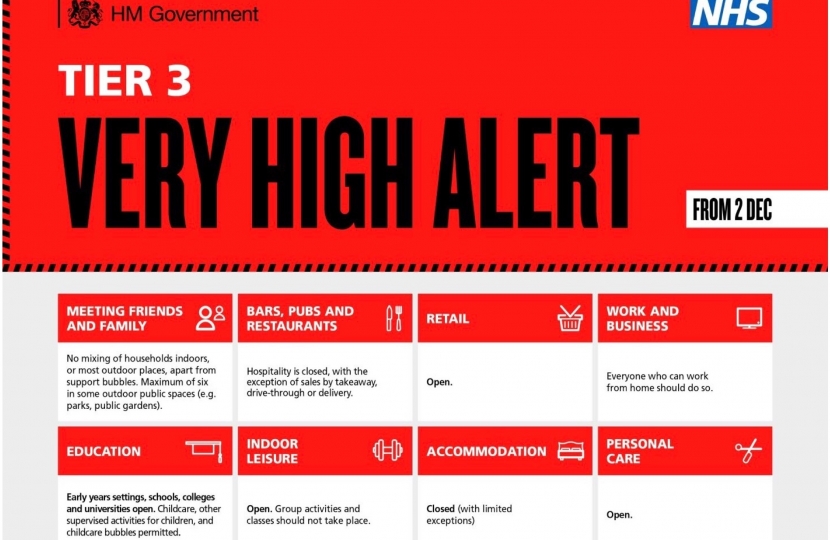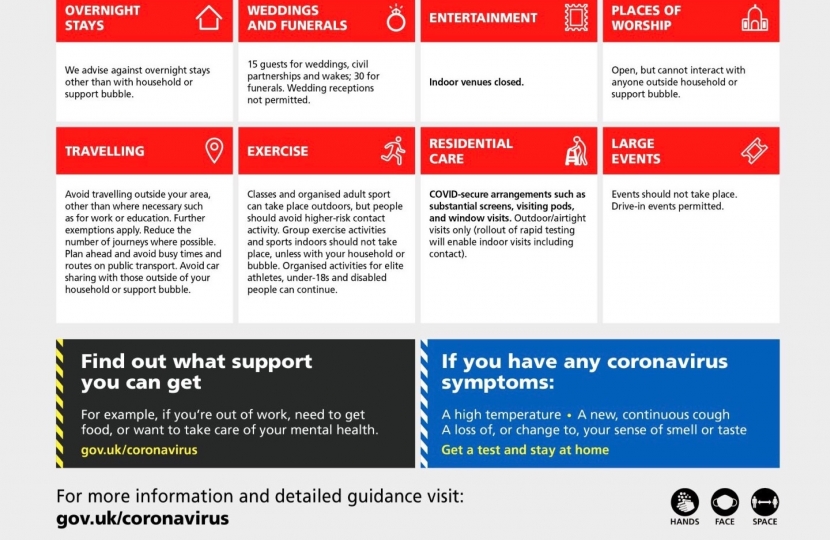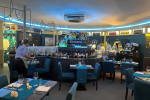Today the Government have announced that Essex will be moving from Tier 2: High alert to Tier 3: Very High Alert, which means Tier 3 local restrictions will apply to all Castle Point constituents. The new rules will come into effect from the beginning of Wednesday 16 December.
Across all tiers, everyone:
- must wear a face covering in most indoor public settings, unless they have an exemption
- should follow the rules on meeting others safely (https://www.gov.uk/government/publications/coronavirus-covid-19-meeting-with-others-safely-social-distancing)
- should attend school or college as normal, unless they are self-isolating. Schools, universities, colleges and early years settings remain open in all tiers
- should walk or cycle where possible, plan ahead and avoid busy times and routes when travelling
- must follow the gathering limits at their tier except for in specific settings and circumstances. These exemptions can be found at: https://www.gov.uk/guidance/local-restriction-tiers-what-you-need-to-know#exemptions
Visits to care homes can take place with arrangements such as substantial screens, visiting pods, and window visits. Regular testing will be offered to up to 2 family members or friends per resident by Christmas, which – when combined with other infection-control measures such as PPE – will support indoor visits with physical contact. Detailed guidance will be published shortly.
All businesses and venues that are open are expected to follow COVID-19 secure guidelines (https://www.gov.uk/guidance/working-safely-during-coronavirus-covid-19) to protect customers, visitors and workers. In all tiers, the following businesses and venues can remain open:
- essential and non-essential retail, including indoor and outdoor markets and car boot sales
- certain leisure and sporting facilities such as gyms, sports courts and facilities, leisure centres, fitness and dance studios, golf courses, swimming pools, riding centres, outdoor playgrounds – subject to relevant social contact rules (https://www.gov.uk/government/publications/coronavirus-covid-19-meeting-with-others-safely-social-distancing) in each tier. Indoor group activities and classes should not take place at tier 3
- personal care and close contact services such as hairdressers and barbers, beauty salons, tattoo parlours, nail salons, spas and beauty services, massage parlours and tanning salons
- public buildings, such as libraries, community centres and halls. They should not host events for private hire, such as birthday parties or most other social activities in tier 3
- allotments, recycling and waste centres, public toilets, car parks
- essential public services such as the NHS and medical services, courts, and jobcentre plus sites
- places of worship – communal worship can now resume, subject to relevant social contact rules in each tier
Everyone who can work from home should do so. Where people cannot do so – including, but not limited to, people who work in critical national infrastructure, construction, or manufacturing – they should continue to travel to their workplace. Public-sector employees working in essential services, including education settings, should continue to go into work where necessary
Tier 3: Very High alert
This is for areas with a very high or very rapidly rising level of infections, where tighter restrictions are in place.
In Tier 3:
- you must not meet socially indoors or in most outdoor places with anybody you do not live with, or who is not in your support bubble, this includes in any private garden or at most outdoor venues
- you must not socialise in a group of more than 6 in some other outdoor public spaces, including parks, beaches, countryside accessible to the public, a public garden, grounds of a heritage site or castle, or a sports facility – this is called the ‘rule of 6’
- hospitality settings, such as bars (including shisha venues), pubs, cafes and restaurants are closed – they are permitted to continue sales by takeaway, click-and-collect, drive-through or delivery services.
- accommodation such as hotels, B&Bs, campsites, and guest houses must close. There are several exemptions, such as for those who use these venues as their main residence, and those requiring the venues where it is reasonably necessary for work or education and training
- indoor entertainment and tourist venues must close. This includes:
- indoor play centres and areas, including trampolining parks and soft play
- casinos
- bingo halls
- bowling alleys
- skating rinks
- amusement arcades and adult gaming centres
- laser quests and escape rooms
- cinemas, theatres and concert halls
- snooker halls
- indoor attractions at mostly outdoor entertainment venues must also close (indoor shops, through-ways and public toilets at such attractions can remain open). This includes indoor attractions within:
- zoos, safari parks, and wildlife reserves
- aquariums, visitor attractions at farms, and other animal attractions
- model villages
- museums, galleries and sculpture parks
- botanical gardens, biomes or greenhouses
- theme parks, circuses, fairgrounds and funfairs
- visitor attractions at film studios, heritage sites such as castles and stately homes
- landmarks including observation decks and viewing platforms
- leisure and sports facilities may continue to stay open, but group exercise classes (including fitness and dance) should not go ahead.
- there should be no public attendance at spectator sport or indoor performances and large business events should not be taking place. Elite sport events may continue to take place without spectators
- large outdoor events (performances and shows) should not take place, with the exception of drive-in events
- places of worship remain open, but you must not attend with or socialise with anyone outside of your household or support bubble while you are there, unless a legal exemption applies
- weddings and funerals can go ahead with restrictions on the number of attendees – 15 people can attend wedding ceremonies, wedding receptions are not allowed, 30 people can attend funeral ceremonies, 15 people can attend linked commemorative events
- organised outdoor sport, and physical activity and exercise classes can continue, however higher-risk contact activity should not take place
- organised indoor sport, physical activity and exercise classes cannot take place indoors. There are exceptions for indoor disability sport, sport for educational purposes and supervised sport and physical activity for under-18s
- you can continue to travel to venues or amenities which are open, but should aim to reduce the number of journeys you make where possible
- avoid travelling outside of your area, including for overnight stays other than where necessary, such as for work, education, youth services, to receive medical treatment, or because of caring responsibilities. You can travel through other areas as part of a longer journey
- for international travel see the Foreign, Commonwealth and Development Office travel advice for your destination and the travel corridors list


